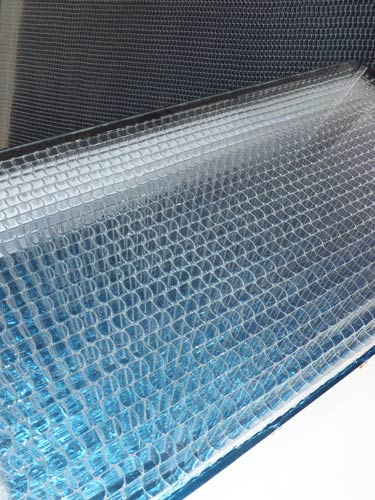By Rivka Borochov
The Bible calls Israel the Land of Milk and Honey. If you ask one solar energy entrepreneur in Israel about that, you’ll see he’s taken the expression quite literally. Shimon Klier invented a new kind of solar energy panel that collects the sun’s rays to directly heat homes in countries that have the largest energy bills.
The inspiration for the collector came by way of the honeybee.
The company based on his invention, founded in 2007, is called Tigi Solar, and it is turning heads at industry conferences in Europe.
Tigi’s revolutionary product is the Honeycomb Collector, which is built like the inside of a bee hive. In regular thermal solar collectors that are used in hot countries like Israel to heat water, much of the thermal radiation leaks out from between the spaces of the panels.
Klier’s patented idea, which started in the early 1980s during the oil crisis, is built on a novel premise –– what he calls “transparent insulation,” letting the sunshine in and keeping its heat from escaping.

Tigi’s Honeycomb Collector keeps the sun’s heat inside
From the outside, the unit closely resembles the PV panel or solar thermal water heaters commonly found on the roofs of Israeli apartment buildings and homes. “If you look up close, you will see something that looks like a honeycomb attached to the collector,” says Zvika Klier, the CEO of Tigi, and the son of Shimon. “The way it works is that the honeycomb absorbs heat quicker, and reduces heat loss, which is normal when it’s really cold outside.
“Our honeycomb gets air circulating between the absorber plate and the freezing glass. The glass normally cools down the absorber plate, but not in this solution; the honeycomb holds the air and prevents it from circulating, and therefore prevents losses from convection,” he says.
Restraining the sun’s power
This kind of insulation used in the solar thermal collectors can heat water to temperatures so high that it can actually damage the machinery, says Klier. For this reason the company has built in a special protection system that stops the water heating past a certain temperature.
Still, the water can get so hot that even in colder countries it can be piped through homes in the winter months for heating.
In countries like Canada, where most of the homes are connected to natural gas, bills for heating are generally reasonable. But at off-grid properties in rural communities or places still relying on propane gas, oil or even electricity, heating costs can be astronomical in the winter -- $1,000 a month or more.
This is where Tigi stands ready to step in. The company offers a low-cost solution that typically would pay for itself quite quickly, says Klier.
He’s not able to offer an ROI (return on investment) figure, since pricing depends on location, size of home and current energy bills. The installation cost is averaging out at 300 to 350 euros per square meter.
Proven success
Zvika Klier is a man with proven business success. Before joining his dad’s business a few years ago, he was the CEO of 3DV Systems, which was sold to Microsoft. Before that, he was president of Arel Communications, a distance-learning company traded on NASDAQ.
Klier brought in other high-tech experts from Israel to join Tigi.
The company is focusing on two business directions: space-heating solutions for homeowners in cold countries; and industrial-scale, year-round water heating. Hotels, prisons, textile companies and factories need unlimited hot water for showers or industrial processes, but in colder countries water heated even with 90 or 100 solar thermal panels wouldn’t deliver the goods, says Klier.
“We can do a better job than most other collectors most of the time,” he says. “Overall, our solution costs less than the alternatives.”
In this direction, the company has signed some contracts in Europe and tested the honeycombs in real-life applications. It is also striking deals with manufacturers of solar collectors.
Klier is convinced that Tigi can get a stake in the multibillion-dollar home heating business, considering that there are 16 million solar thermal collectors already in use around the world -- yet most, if not all of them, are installed in hot climates where they are used only to heat water.
At the Intersolar EuropExhibition held in Germany in June 2012, Tigi was awarded a top prize. As a result, interest from the German market is high, and Germany is a good place to start because it has advanced targets in renewable energy.
Tigi is based in Petah Tikvah, Israel, and employs 10 people. It has been privately financed by the family and angel investors up to now, but seeks $3 million to $5 million for marketing and sales.